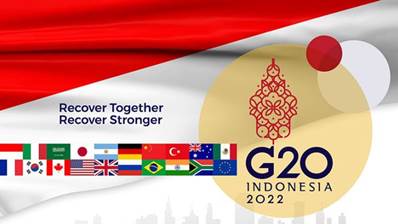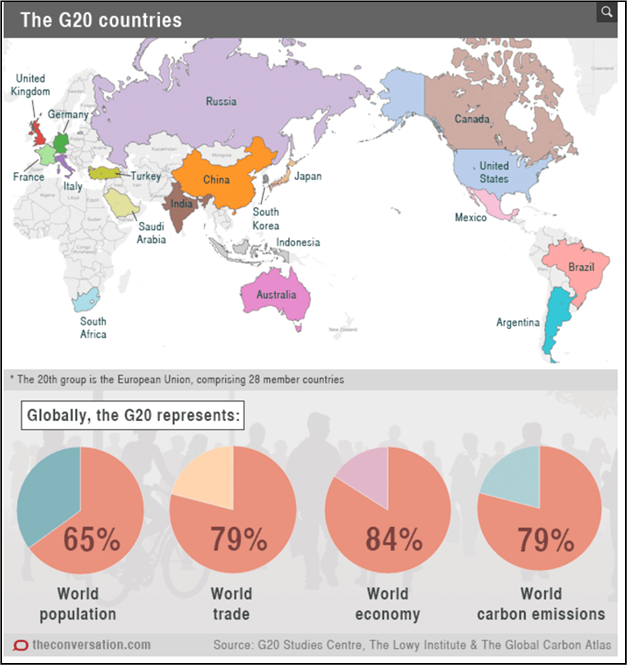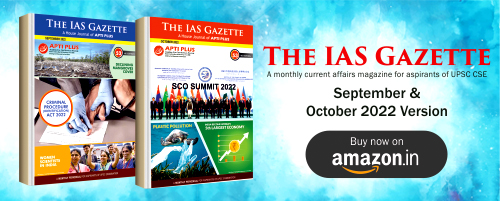SANSAD TV
PERSPECTIVE - G-20 SUMMIT: KEY TAKEAWAYS

Disclaimer: Copyright infringement not intended.
Context
About G-20
- The G20or Group of Twenty is an intergovernmental forum comprising 19 countries and the European Union (EU). It works to address major issues related to the global economy, such as international financial stability, climate change mitigation, and sustainable development.
- The G20 is composed of most of the world's largest economies, including both industrialized and developing nations; it accounts for around 80% of gross world product(GWP), 59–77% of international trade, two-thirds of the global population, and 60% of the world's land area.
- The G20 was founded in 1999 in response to several world economic crises. Since 2008, it has convened at least once a year, with summits involving each member's head of governmentor state, finance minister, or foreign minister, and other high-ranking officials.

Organizational Structure of G20
- The G-20 operates without a permanent secretariat or staff. The chair rotates annually among the members and is selected from a different regional grouping of countries.
- The chair is part of a revolving three-member management group of past, present and future chairs referred to as the Troika. The current chair of the G-20 is Indonesia; the next Chair will be India.
Parallel Tracks of G-20
- The G20 consists of two parallel tracks: the Finance Track (led by finance ministers and central bank governors of the member countries) and the Sherpa Track (personal emissaries of the leaders).
- The Sherpas’ Track focuses on non-economic and non-financial issues, such as development, anti-corruption and food security, while addressing internal aspects such as procedural rules of the G20 process. The Sherpas carry out important planning, negotiation and implementation tasks continuously.
- The Finance Track focuses on economic and financial issues. The Sherpa and Finance tracks both rely on the technical and substantive work of a series of expert working groups.

2022 G20 Summit Bali Theme
- The 17th edition of the G20 Summit will extensively focus on key issues of global concern under the theme of 'Recover Together, Recover Stronger'.
Highlights of 2022 G-20 Summit
Condemning Russian Aggression
- A draft of a declaration by leaders of G20 countries said "most" members strongly condemned the war in Ukraine.
- The countries involved stressed it was causing immense human suffering and exacerbating existing fragilities in the global economy.
- The G20 members also voiced deep concern over the challenges posed to global food security by escalating tensions.
- They called for the need for central bank independence to ensure they keep up efforts to rein in soaring inflation.
Today’s Era not of War
- India’s stand that this is “not an era of war” found an echo in the communiqué.
- Leaders of the world’s largest economies called for upholding international law in the context of the Ukraine war and rejecting the threat of use of nuclear weapons.
- India’s declaration echoed PM Modi's message that said "today's era must not be of war".
Food and Energy Security
- G20 leaders pledged to take action to –
- promote food and energy security.
- support stability of markets.
- provide temporary and targeted support to cushion the impact of price increases.
- strengthen dialogue between producers and consumers.
- increase trade and investments for long-term food and energy security needs, resilient and sustainable food, fertilizer and energy systems.
Hunger and Malnutrition
- Countries committed to taking urgent actions to save lives, prevent hunger and malnutrition, particularly to address the vulnerabilities of developing countries.
Rules based WTO
- The leaders reiterated their support for "open, transparent, inclusive, predictable, and non-discriminatory, rules-based agricultural trade based on WTO rules".
Read: Criticism of WTO: https://en.wikipedia.org/wiki/Criticism_of_the_World_Trade_Organization
Diversification of Energy Systems
- G20 leaders emphasised the importance of ensuring that "global energy demand is matched by affordable energy supplies".
- They underlined "the urgency to rapidly transform and diversify energy systems, advance energy security and resilience and markets stability, by accelerating and ensuring clean, sustainable, just, affordable, and inclusive energy transitions and flow of sustainable investments".
Read about Green Energy: https://iasgyan.in/daily-current-affairs/green-energy
Climate Change
- G20 leaders agreed to pursue efforts to limit the global temperature increase to 1.5 degrees Celsius - confirming they stand by the temperature goal from the 2015 Paris Agreement on climate change.
- G20 leaders recognised the need to speed up efforts to phase down coal use, in a potential boost to the COP27 climate talks.
Read: https://www.iasgyan.in/daily-current-affairs/carbon-credits-market
Equitable Medical Access
- The importance of strengthening national health systems was also stressed upon in the declaration. The leaders emphasized the need for equitable access to pandemic medical countermeasures.
Pandemic
- On the pandemic fund, G20 leaders supported the establishment of a new Financial Intermediary Fund for Pandemic PPR (the 'Pandemic Fund') hosted by the World Bank. They called on "new donors to join the Pandemic Fund, as they are able to".
Global Pathogen Surveillance
- To enable global pathogen surveillance G20 leaders encouraged sharing of pathogen data in a timely manner on shared and trusted platforms in collaboration with the World Health Organization (WHO).
Currency Volatility
- G20 leaders said their central banks will continue to calibrate the pace of monetary policy tightening, while being mindful of the need to limit "cross-country spillovers."
- They also reaffirmed their commitment to avoid excessive exchange-rate volatility while recognising that "many currencies have moved significantly" this year.
Read: https://www.iasgyan.in/daily-current-affairs/currency-volatility-and-falling-rupee
PPP and Technology Transfer
- G20 leaders underscored the importance of public-private partnership, and technology transfer and knowledge sharing on voluntary and mutually agreed terms.
BEPS
- Members called on the "OECD/G20 Inclusive Framework on Base Erosion and Profit Shifting (BEPS) to finalize Pillar One.
- This includes signing the Multilateral Convention in the first half of 2023 plus complete the negotiations of the Subject to Tax Rule (STTR) under Pillar Two that would allow the development of a Multilateral Instrument for its implementation.
|
OECD/G20 Inclusive Framework
The OECD/G20 Inclusive Framework on BEPS brings together over 135 countries and jurisdictions to collaborate on the implementation of the BEPS Package. The BEPS package provides 15 Actions that equip governments with the domestic and international instruments needed to tackle tax avoidance.
Base Erosion and Profit Shifting
In this, Firms make profits in one jurisdiction, and shift them across borders by exploiting gaps and mismatches in tax rules, to take advantage of lower tax rates and, thus, not paying taxes to in the country where the profit is made.
|
Cryptocurrencies
- On cryptocurrencies, the G20 countries welcomed approach for establishing a comprehensive international framework for the regulation of crypto-asset activities based on the principle of 'same activity, same risk, same regulation'."
Read: https://www.iasgyan.in/daily-current-affairs/regulating-cryptocurrencies
Digital Push by India
- India said digital transformation should not be confined to a small part of the “human race” and its greater benefits will be realised only when digital access becomes “truly inclusive”.
- It is the responsibility of us G-20 leaders that the benefits of digital transformation should not be confined to a small part of the human race.
Criticism of UN
- Addressing the G20 Summit, PM Modi criticised the UN saying that it has failed to tackle issues that are troubling the world as a result of the Russia-Ukraine war and the COVID-19 pandemic.
- He said that the countries failed to make suitable reforms in the UN and hence the world now has greater expectations from the G20 and its relevance has become far more significant.

Read: https://en.wikipedia.org/wiki/Criticism_of_the_United_Nations
India’s Energy Security
- India's energy-security is also important for global growth, as it is the world's fastest-growing economy. We must not promote any restrictions on the supply of energy and stability in the energy market should be ensured said India.
- By 2030, half of our electricity will be generated from renewable sources. Time-bound and affordable finance and sustainable supply of technology to developing countries is essential for inclusive energy transition.
Crisis of Essentials
- There is a crisis of essentials, essential goods all over the world. The challenge for the poor citizens of every country is more severe. Everyday life was already a struggle for them.
- The poor do not have the financial capacity to deal with the "double whammy". "Due to the double whammy, they lack the financial capacity to handle it. Multilateral institutions such as the UN have been unsuccessful on these issues.
Significance of upcoming G-20 Summit
- From December 1 2022, India will assume the G20 presidency for a year and chair over 200 meetings that aim to secure global economic growth and prosperity.
- The 18th G20 Heads of State and Government Summit will take place on 9-10 September 2023 in New Delhi. The Summit will be a culmination of all the G20 processes and meetings held throughout the year among ministers, senior officials, and civil societies.
- India's G20 presidency will be inclusive, ambitious, decisive, and action-oriented, noting that the country is taking the charge at a time when the world is grappling with geopolitical tensions, economic slowdown and rising food and energy prices.
- G-20 Bloc does not have a permanent secretariat and the presidency is supported by the Troika – previous, current and incoming presidency. During India’s presidency, the troika will comprise Indonesia, India and Brazil, respectively.
- India will, in the true spirit of Vasudhaiva Kutumbakam (the world is one family), seek to find pragmatic global solutions for the well-being of all.
- Under India’s leadership, G20 nations will look to find consensus on major challenges like a slowing global economy, a debt crisis that will impact almost 70 countries, millions around the world slipping back into poverty due to Covid-19 and the existential climate crises
- Through its leadership position, India may steer the G20 towards providing adequate finance to the 'Global South', keeping in line with climate justice.
- A second key agenda item will be reforms in institutions like the World Bank, the International Monetary Fund and the World Trade Organisation. The aim is to make them more attuned to the needs and aspirations of developing economies.
- India's G20 mantra is: One Earth, One Family, One Future. It is these thoughts and values of India that pave the way for the welfare of the world.
https://sansadtv.nic.in/episode/perspective-g20-summit-key-takeaways-16-november-2022
https://www.cnbctv18.com/world/g20-declaration-russia-ukraine-war-cryptocurrencies-climate-food-security-covid-15183991.htm
https://www.firstpost.com/world/g20-summit-2022-key-takeaways-from-pm-modis-visit-to-the-annual-event-11645051.html





